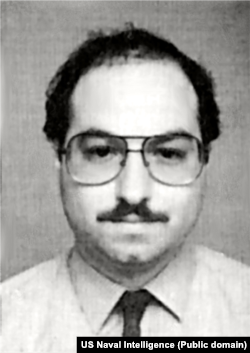WASHINGTON —
President Obama’s planned visit to Israel later this month has triggered renewed calls for Washington to free jailed American spy Jonathan Pollard. A petition of his release has already been signed by 100,000 Israelis, among them, Yair Lapid, leader of the Yesh Atid Party. Israel’s parliament, the Knesset, has been debating the issue this week. For decades, the White House has refused to release Pollard. But that hasn’t stopped his supporters from pleaing his case.
Background
In 1985, the U.S. government accused Pollard of selling classified documents to Israel while he was employed as a U.S. Navy intelligence specialist. Initially, Israel denied having anything to do with Pollard’s activities, but did grant him Israeli citizenship in 1996, and two years later formally admitted that he had worked as an official agent for the Jewish state.
Prosecutors arranged a plea-bargain, by which Pollard pleaded guilty to conspiracy to commit espionage. In exchange, the government said it would recommend a “substantial” prison term, as opposed to life imprisonment.
For love or money?
For years, Pollard’s defenders have argued that he acted in order to protect Israel from its regional enemies.
Among those defenders is Lawrence Korb, a deputy secretary of defense at the time Pollard was arrested. Korb is in Jerusalem this week for meetings with Prime Minister Benjamin Netanyahu, President Shimon Peres and Knesset leaders.
Now a Senior Fellow at the Washington-based Center for American Progress, Korb says Pollard’s punishment far exceeds the crime.
“He was not convicted of treason, and that, of course, is a key thing,” Korb said. “He pled guilty to furnishing classified information to an ally, which is different. Treason is if you furnish something to an enemy that can be used against you, and I think that’s a very important point.”
Korb points to the original half-page victim impact statement to support his point.
“In fact the victim impact statement said the damage done to the United States was basically that it undermined our leverage with the Israelis in terms of things that we could get, as well as undermined our credibility with Arab nations,” Korb said.
In other words, according to Korb, friendly nations routinely exchange intelligence, but in this case, the U.S. received nothing back from Israel, and the information that Pollard gave Israel was much more highly classified than what the U.S. would have normally offered. An embarrassment, says Korb, but hardly punishable by life in prison.
Defense attorney Eliot Lauer and his partner Jacques Semmelman have represented Pollard since spring 2000.
“What you have is a man that violated his oath,” Lauer said, “foolishly and impetuously gave a volume of information to an ally dealing with threats to the state of Israel, for which he deserved to be incarcerated. But no one who has been sentenced and convicted of a similar offense has served even 25 percent of this sentence.”
Assessing harm done
Because the case never went to trial, the extent of the damage caused by Pollard’s spying is unclear to all but a few. Just before sentencing, then-Secretary of Defense Caspar Weinberger submitted a CIA damage assessment.
Available online but heavily redacted, the assessment says Pollard sold Israel “a large and varied body of classified material” posing “risks of several kinds to U.S. intelligence sources and methods, analytical capabilities and intelligence exchanges, and foreign policy interests, including the possibility of extended compromise of some of Pollard's material to third countries”--referring to speculation that some information may have ended up in KGB hands.
Weinberger also submitted an supplemental four-page declaration in which he said he believed Pollard would continue divulging top secrets “without restraint,” if he had the chance. “It is difficult for me,” Weinberger wrote, “to conceive of a greater harm to national security than that caused by the defendant.
One day later, a federal judge sentenced Pollard to life in jail.
Pollard’s attorney Lauer says the case was weak. “All that Weinberger was saying…is that it could possibly be that there was greater harm than the harm described in the victim impact statement. But it’s all in the context of ‘possible.’”
“It was 1985, the Year of the Spy,” says Lauer, referring to several high-profile spy cases in the U.S. that year. He says the government gave Pollard an overly harsh sentence to set an example to others the government suspected were spying but had not yet caught.
Punishment fits crime
Joseph E. diGenova is a former U.S. Attorney for the District of Columbia and served as the chief prosecutor in case. As such, he had full access to the CIA report, as did defense attorneys and Pollard himself. He says Pollard got exactly what he deserved.
“There wasn’t ever any doubt that he spied for Israel and caused some of the greatest damage to U.S. national security in the history of the country,” diGenova said. “He leaked information that was in what we call ‘top secret code word…which included technical information and memorandums and data which were able to identify human intelligence and signals intelligence, which is National Security Agency-type material.”
Just how much material Pollard provided Israel has never been revealed, but Pollard himself estimated it could take up a space six feet wide, six feet long and 10 feet high.
DiGenova also questions why Pollard, who has been eligible for parole for more than 20 years, seeks clemency instead.
“I don’t know what his goal is and I don’t know what the goal of his supporters is, but I do know as a matter of legal fact is that he has never sought parole, even though he is entitled to do so,” he said.
Lauer told VOA, “Mr. Pollard has a far better chance [of getting released] in a court of world opinion, public opinion, and a fair-minded president and his staff.”
White House spokesman Jay Carney recently told reporters that the White House has changed its position on keeping Pollard in jail. Israeli press reports Netanyahu will bring up the issue when Obama visits him in his home March 20.
In the meeting with Knesset leaders this week, Korb said he advised Israel to “admit they were wrong, turn over all the material and promise not to do it again.”
Background
In 1985, the U.S. government accused Pollard of selling classified documents to Israel while he was employed as a U.S. Navy intelligence specialist. Initially, Israel denied having anything to do with Pollard’s activities, but did grant him Israeli citizenship in 1996, and two years later formally admitted that he had worked as an official agent for the Jewish state.
Prosecutors arranged a plea-bargain, by which Pollard pleaded guilty to conspiracy to commit espionage. In exchange, the government said it would recommend a “substantial” prison term, as opposed to life imprisonment.
For love or money?
For years, Pollard’s defenders have argued that he acted in order to protect Israel from its regional enemies.
Among those defenders is Lawrence Korb, a deputy secretary of defense at the time Pollard was arrested. Korb is in Jerusalem this week for meetings with Prime Minister Benjamin Netanyahu, President Shimon Peres and Knesset leaders.
Now a Senior Fellow at the Washington-based Center for American Progress, Korb says Pollard’s punishment far exceeds the crime.
“He was not convicted of treason, and that, of course, is a key thing,” Korb said. “He pled guilty to furnishing classified information to an ally, which is different. Treason is if you furnish something to an enemy that can be used against you, and I think that’s a very important point.”
Korb points to the original half-page victim impact statement to support his point.
“In fact the victim impact statement said the damage done to the United States was basically that it undermined our leverage with the Israelis in terms of things that we could get, as well as undermined our credibility with Arab nations,” Korb said.
In other words, according to Korb, friendly nations routinely exchange intelligence, but in this case, the U.S. received nothing back from Israel, and the information that Pollard gave Israel was much more highly classified than what the U.S. would have normally offered. An embarrassment, says Korb, but hardly punishable by life in prison.
Defense attorney Eliot Lauer and his partner Jacques Semmelman have represented Pollard since spring 2000.
“What you have is a man that violated his oath,” Lauer said, “foolishly and impetuously gave a volume of information to an ally dealing with threats to the state of Israel, for which he deserved to be incarcerated. But no one who has been sentenced and convicted of a similar offense has served even 25 percent of this sentence.”
There is this unfair, incorrect notion spread by the nay-sayers that somehow Pollard gave high-tech military technology to Israel that might leak to Russia, that somehow he gave information that might have compromised agents or sources of information.Defense attorney Eliot Lauer to VOA
Because the case never went to trial, the extent of the damage caused by Pollard’s spying is unclear to all but a few. Just before sentencing, then-Secretary of Defense Caspar Weinberger submitted a CIA damage assessment.
Available online but heavily redacted, the assessment says Pollard sold Israel “a large and varied body of classified material” posing “risks of several kinds to U.S. intelligence sources and methods, analytical capabilities and intelligence exchanges, and foreign policy interests, including the possibility of extended compromise of some of Pollard's material to third countries”--referring to speculation that some information may have ended up in KGB hands.
Weinberger also submitted an supplemental four-page declaration in which he said he believed Pollard would continue divulging top secrets “without restraint,” if he had the chance. “It is difficult for me,” Weinberger wrote, “to conceive of a greater harm to national security than that caused by the defendant.
One day later, a federal judge sentenced Pollard to life in jail.
Pollard’s attorney Lauer says the case was weak. “All that Weinberger was saying…is that it could possibly be that there was greater harm than the harm described in the victim impact statement. But it’s all in the context of ‘possible.’”
“It was 1985, the Year of the Spy,” says Lauer, referring to several high-profile spy cases in the U.S. that year. He says the government gave Pollard an overly harsh sentence to set an example to others the government suspected were spying but had not yet caught.
There wasn’t ever any doubt that he spied for Israel and caused some of the greatest damage to U.S. national security in the history of the countryFormer prosecutor Joseph E. diGenova to VOA
Punishment fits crime
Joseph E. diGenova is a former U.S. Attorney for the District of Columbia and served as the chief prosecutor in case. As such, he had full access to the CIA report, as did defense attorneys and Pollard himself. He says Pollard got exactly what he deserved.
“There wasn’t ever any doubt that he spied for Israel and caused some of the greatest damage to U.S. national security in the history of the country,” diGenova said. “He leaked information that was in what we call ‘top secret code word…which included technical information and memorandums and data which were able to identify human intelligence and signals intelligence, which is National Security Agency-type material.”
Just how much material Pollard provided Israel has never been revealed, but Pollard himself estimated it could take up a space six feet wide, six feet long and 10 feet high.
DiGenova also questions why Pollard, who has been eligible for parole for more than 20 years, seeks clemency instead.
“I don’t know what his goal is and I don’t know what the goal of his supporters is, but I do know as a matter of legal fact is that he has never sought parole, even though he is entitled to do so,” he said.
Lauer told VOA, “Mr. Pollard has a far better chance [of getting released] in a court of world opinion, public opinion, and a fair-minded president and his staff.”
White House spokesman Jay Carney recently told reporters that the White House has changed its position on keeping Pollard in jail. Israeli press reports Netanyahu will bring up the issue when Obama visits him in his home March 20.
In the meeting with Knesset leaders this week, Korb said he advised Israel to “admit they were wrong, turn over all the material and promise not to do it again.”






